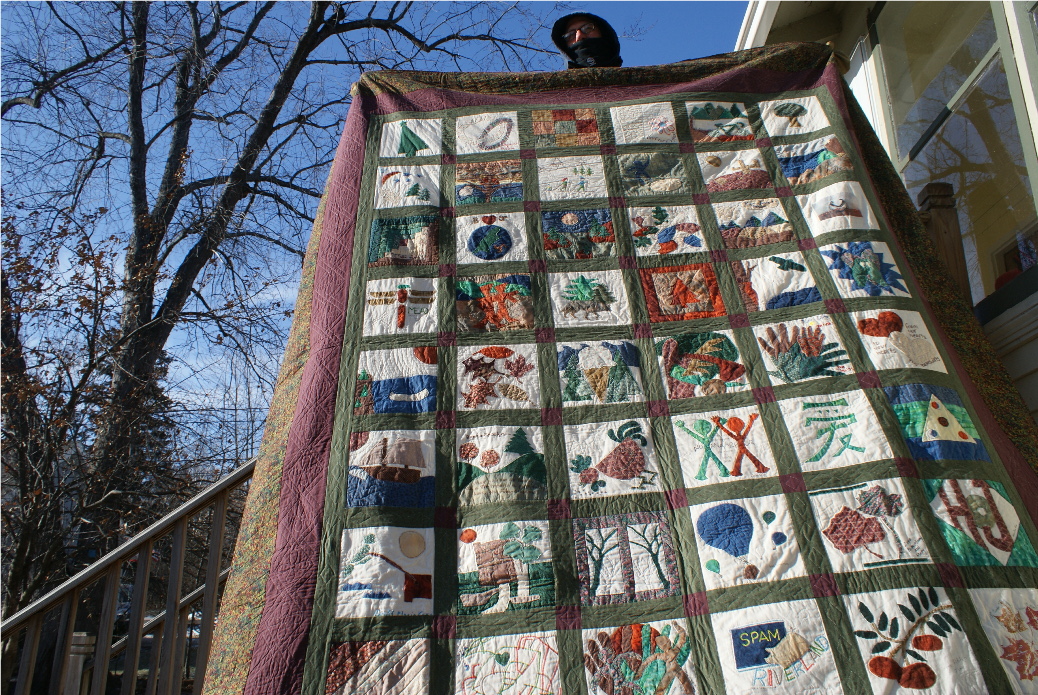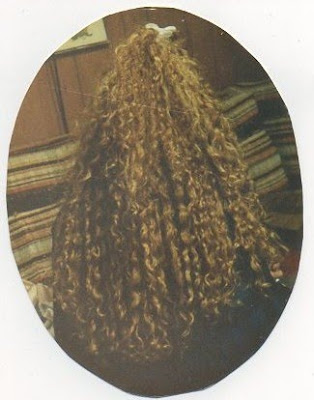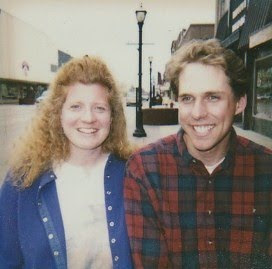My dad was the person who taught me to be comfortable with silence. We could get in the car and drive for twenty minutes without a word being spoken. While his and my mother’s relationship ultimately cracked under the weight of that silence, for me, the daughter, his quiet felt benign, reassuring, a safe place to be.
Even more, when he did speak, his words carried weight. A handful of my strongest memories, in fact, center around moments when he engaged in verbal expression. One time, after I’d won a forensics tournament out of town, returning from the meet during the early hours of the morning, I left my trophy on the dining room table. By the time I woke up later that day, my dad had left a note, telling me he was so proud, pronouncing he was “busting his buttons.” Another time, after I’d behaved badly, he sat across from my hungover self and told me he was “deeply disappointed.” Many years later, during the night when a bat flew into my house, and I had a histrionic “I’m all alone, and the bat is trying to kill me” meltdown for three hours in my bathroom, I managed to grab my phone and call my parents, over a thousand miles away. When I sobbed and sobbed that a killer beast was out there, and all I had were tampons for friends and nail files for weapons, my dad, casting about, counseled, “What you need to do is reach way down inside yourself now and find something you don’t think you have. Dig deep, and you’ll find something you need.” He was right. We hung up, and I dug deep, finding inside myself the numbers 911, which I punched into the phone with great bravery.
Perhaps my fondest conversation with my dad occurred about a decade before his death. Chatting on the phone, we stumbled across the subject of my sister and me and our many differences. Trying to qualify the nature of the differences, my dad remarked that my sister took after his side of the family, where a certain dourness and pessimism sometimes manifested themselves. “She reminds me of myself,” he noted, continuing, “and you don’t. You’re more, well, effervescent.”
There it was: one of those moments we hope for with our parents, those moments when they give us a word, an adjective, a feeling of being seen, and it signifies everything: that they see us as separate, as differentiated beings; that they have thought about us; that they have taken stock of us; that we are far enough away from them for the space to have cleared everyone’s vision. Because such words, such adjectives, are born from the lifelong process of symbiosis to independence, they have power. Plus, anytime someone describes me to myself, I believe him.
It wasn’t even so much that I wanted to think of myself as “effervescent” – although it was a welcome label – but rather, it was more that I wanted to think of my dad thinking of me that way. Sometimes, from then on, I effervesced just for him.
It surprised me, then, to learn – repeatedly – that a pipping personality didn’t reap greater rewards, in the larger scope of the world. Certainly, I didn’t expect to be voted into office on the Effervescence Platform, nor did I expect the medical field to approach me, asking me to donate to the Effervescence Transfusion Bank. But I had expected being smiley and liking sunshine might have snagged me a boyfriend.
I did date a man throughout my 20’s, and then I truly, madly, deeply dated another guy – one who left my two liters of effervescence out on the counter with the cap off and made all the bubbles go flat. He de-carbonated me in a way that no one ever had before, not even the boys on the high school bus who moo-ed at my sister and me.
He made my sizzle fizzle.
And then my grandma died, and the doctor found a lump in my breast.
I was thirty-one.
Thirty-one wasn’t my favorite year.
Fortunately, just when I was pacing the circle of my small kitchen for the 123rd time in an hour, gnawing on my cuticles, I still had girlfriends who called, opening with, “Oh, honey. I just heard. Talk to me.” Even when I would have to set down the phone to grab another handful of Kleenex, they would stay on the line, shouting things like, “From the amount of snot you’re emitting, you do seem well-hydrated. And that’s something, right?” Also, I had extended family who knew how to circle around sideways and never look me straight in my teary eyes. Instead, they gave me food and invited me to participate in the yearly butchering of the deer after the hunt in November. Gently, they wove easy affection around my heartache.
Eventually, the molasses movement of seconds turned into minutes finally adding up into hours and days, and then months went by. My grandma was buried; the lump was benign; the former boyfriend had a new girl.
Just after the new year, one of my hunting cousins sent me an email, asking if I’d like to drive north to come visit his family and, by the way, if I would be at all interested in letting him serve as my “agent in the field,” romantically.
Flattened, completely without zest or hope, my response was worthy of my father’s side of the family: “Go ahead, if you want to, but I won’t expect anything from it.”
As it turned out, my cousin already had someone in mind, a twenty-eight-year-old colleague he worked with in a very small town of about 300 people. One day, sitting in the office, looking across at this twenty-eight-year-old, my cousin started musing, “How’s Byron ever going to find someone in this bohunk town?” A moment later, he thought back to Thanksgiving, the deer butchering, and the conversations we’d had, which resulted in, “For that matter, how’s my poor cousin ever going to find someone in the bohunk town where she’s living?”
His head swiveled back and forth, and his thoughts rammed into each other. He approached his co-worker, Byron, who agreed, “Sure, you can be my agent in the field. But this cousin of yours, since she lives more than five hours away, she’d have to really knock my socks off for me to start seeing her.” Fair enough. Next, my cousin approached me.
It was agreed: I’d drive the five hours north and, while visiting my cousin’s family, meet Byron. In the past, imbued with effervescence, I’d greeted any opportunity to meet a potential partner with gusto and a knee-jerk, involuntary planning of our lives together. This time, I didn’t think much of the whole thing.
We’d see.
That February, over Presidents’ Day weekend, I visited. I got to hold my cousin’s baby and watch his four-year-old ice skate. One afternoon, we stopped by the campus where my cousin taught environmental education. As we drove away, he said, casually, “Oh, that man back there who was leaning down, talking to people through their car window? The one in the red hat? That was Byron.”
My cousin, perhaps, didn’t understand that such information would have been welcome, say, two minutes earlier.
That night, the guy in the red hat strolled into my cousin’s house, there for The Meeting, there for dinner. He carried a six-pack of homebrew.
I liked him already.
In short order, I learned that Byron not only wore a red hat and was quite tall. I also learned he really liked making bread, reading the Atlantic Monthly, and running on trails. I learned that he was an anthropology major who’d minored in environmental science. I learned that his Desert Island food would be cheese (dropped from a helicopter once a month, to supplement the fish and coconuts he would be living on otherwise); his Desert Island album would be Van Morrison’s Moondance; his Desert Island book would be some sort of reference volume, all the better if it contained maps.
I learned that, while the idea of him hadn’t infused me with bubbles, the reality of him was creating a few tiny pops.
Dinner lasted five hours. As soon as he left, my previously-cool cousin and his wife, who had discreetly retired to the kitchen eight feet away after dessert, were all nerves. They gave me thirty seconds after the door closed behind Byron before yelling, “SO? SO?????”
My response was positive, but guarded. He seemed nice. I would see more of him. If he wanted to.
Because all the little broken pieces inside of me weren’t quite realigned yet, I wasn’t going to put myself forward this time. I couldn’t take another dashing.
Fortunately, a few days later, Byron asked my cousin for my email address. The interest had been mutual. Apparently, his strongest first impression of me was that I had a lot of hair. He thought he could get lost in it.
What ensued was a modern epistolary courtship. For three weeks, we sent messages back and forth, discovering that writing is an excellent way to get to know someone: the small talk is non-existent; the conversations get to meaty matters right away; there is no body language to read or misread, no annoying laugh to cringe from.
After three weeks, Byron announced he was ready to “jump off the comfortable dock” and into the potentially-frigid waters of face-to-face. Thus, during my Spring Break in March, I headed north again, for our first real date.
As we sat in a dingy bar, having burgers and beers, conversation flowed. Snow fell.
14 inches of it.
When it came time to take Byron to his house before driving back to my cousin’s place, my car got stuck. In the snow. At Byron’s house. He didn’t seem to mind. His roommates were friendly. I stayed over.
I had no choice.
What I learned in those days of my Spring Break was that Byron liked to listen to me read aloud – and if that’s not an activity of the infatuated, I don’t know what is. He also proved that he’s very good at necking.
And, about three days in, after he’d had a bath one night, Byron came back into his bedroom, where I lounged. “Brrrrrr,” he exclaimed. “My feet are cold!”
“Why are they so cold? Was the bath water not warm enough?” I asked.
“No. They’re freezing because. you. knocked. my. socks. off.”
Suddenly, BAM: there it was. The effervescence was back, the flatness banished.
Everything was going to be all right.
Not too long afterward, as I stared very hard at the ceiling, I admitted I had fallen in love. He had the right answer.
By the end of my Spring Break week, five days after our first date, we had talked about what kind of wedding we wanted.
Four months later, one July morning, as I slept on a futon on the floor, he crawled in with a plate of pancakes and a Betsy Bowen woodcut entitled “Fox on a Journey.”
He asked me to marry him.
In quick order, we planned a wedding for the following May.
In even quicker order — that night — I got pregnant. Three months after that, I had a miscarriage. Four days after that, we found out I’d been carrying twins, and one was still hanging on.
We moved the wedding to November, not even nine months after we first played the Desert Island game over dinner. Byron became my groom right there at the environmental learning center where I’d first not-quite-spotted-him in his red hat. The bleeding from the miscarriage had stopped three days earlier. I sobbed through the vows.
Four months later, we two became we three.
All of that wonder unfolded in 1999. Not given to dreaming about the future before then, I have since been granted beauties I couldn’t possibly have imagined.
And, like my father, he is gentle. Like my father, he has a thousand-watt smile.
Like my father, he is given to quiet, most comfortable in stillness.
He likes it when I reach under his shirt and scratch his back.
He cooks dinner every night.
He was our stay-at-home parent for 14 years after that baby girl (and later her brother) was born.
He sits on the living room floor with me, straddling my leg, holding two lengths of kinesio tape as I shift my patella this way, then that. Expertly, teasing me about how I shredded my fingernails trying to remove the adhesive backing the first time we tackled “Care of Jocelyn’s Ailing Knee,” he applies the tape from calf to thigh, giving it a pat of hopeful optimism as he says, “I hope this keeps you spry for at least four days.”
He is unfazed by my random bursts of tears.
He is whimsical. He is dry. He is perceptive.
He sees that my ability to talk to people is as valuable as his ability to do everything else.
He cross-stitches abstracts of swirls in squash soup and burn marks left on the pan after vegetables have been roasted.
He knows how to give me directions that make sense, like “go straight until you see the big rock shaped like Richard Nixon’s head.”
He hears my ideas and helps me realize them.
He falls into 90-Day Fiance addiction so we can compare notes on which Russian brides are too smart for the Ohio doofuses they settle for.
He laughs at the suggestion we move our yoga mats so that their edges touch, noting it’s the space between that allows us to breathe.
And in the darkness of night, when I whimper in my sleep because I can’t save the babies from the soldiers, his touch on my back pulls me to safety.
Now, twenty years in to the marriage, there is nothing we love more than to sit and watch the world flit by
holding hands in companionable silence.
_________________________________________





Leave a Reply